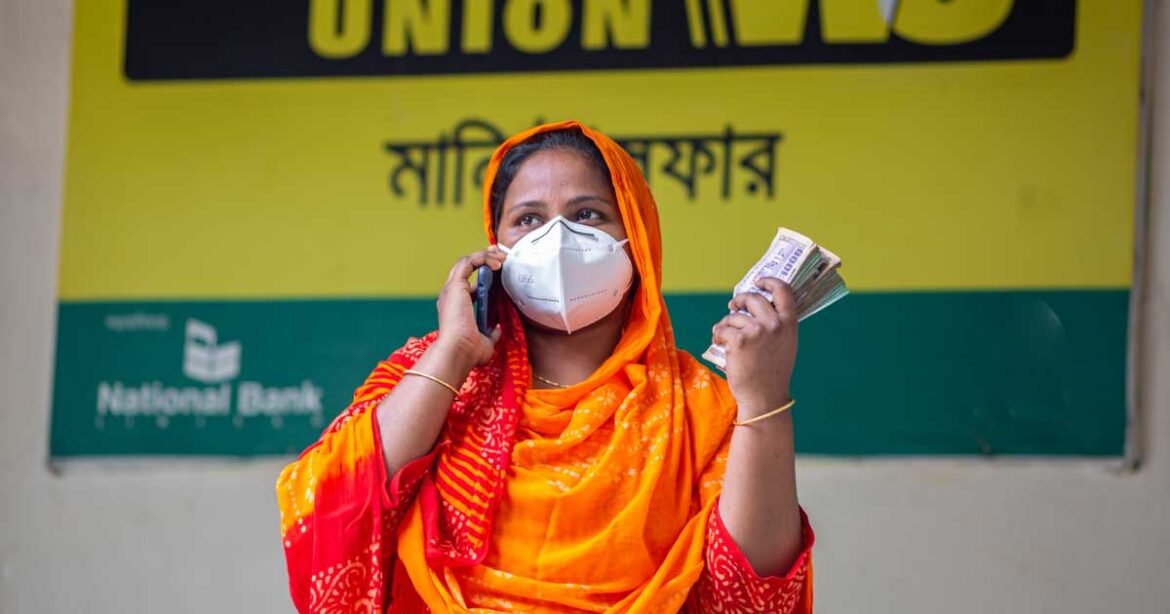Families of Bangladeshi migrant labourers are playing vital roles to the country’s rural economy’s development. The inflow of remittance not only creates demand for goods and services but also contributes to small-scale income-generating opportunities.
Various studies have shown that families receiving remittance tend to spend more on essential needs such as education, healthcare, food and sanitation compared to other groups. This highlights the positive impact of remittance on the living standards of rural families, which plays a significant role in ensuring financial security and overall well-being.
YOU CAN ALSO READ: PROSPECT OF MATARBARI SEA PORT IN BANGLADESH’S ECONOMY
With rural areas accounting for a significant portion of the population, the growth in financial capacity and consumer spending could lead to a more balanced and inclusive economic development across Bangladesh.
Impact of remittance in statistics
A study conducted by the Bangladesh Bureau of Statistics (BBS) revealed that 62% of the 2.7 million workers who went abroad between 2015 and 2018 hailed from rural areas. Remittance from these workers has become a major driver of the rural economy, alongside agricultural activities.
The BBS’s “Household Income and Expenditure Survey-2016,” published in 2019, showed that 68.44% of remittance received by rural families is used to meet basic needs, while 27.98% is invested in various ventures. These investments are critical in creating more economic opportunities and strengthening the rural economy.
Furthermore, according to current Bangladesh Bank data, bank deposits in rural parts of Bangladesh have more than doubled in the last five and a half years. The increase in deposits outside of municipalities and city corporations indicates a rising financial capacity of rural people, which is contributing to the development of a strong consumer class.
Data shows that total deposits in rural areas stood at Tk3.4 lakh crore in June 2021, compared to Tk1.61 lakh crore at the beginning of 2016. This increase in rural savings is primarily due to an increase in remittance earnings, as 90% of inward remittances are dispersed to beneficiaries in rural regions, according to the central bank’s statistics.
Increase of inflow through agent banking
According to data from Bangladesh Bank, families of migrant workers in rural areas have received about Tk 1.04 lakh crore in remittance since the introduction of agent banking in 2013. This accounted for almost 91% of the Tk 1.14 lakh crore in remittances received via agency banking during the same period. The country’s total inward remittance reached Tk 12.54 lakh crore between fiscal years 2013-14 and 2021-22.
The adoption of agent banking and mobile financial services has significantly contributed to the growth of the rural economy, as evidenced by the number of mobile financial accounts which has surpassed the total population of the country, reaching over 18 crore in July last year. About 56% of the account holders are from rural areas, according to the Bangladesh Bank.
However, despite the significant contribution of remittance and alternative banking channels to the rural economy, there is still a need to address challenges such as a lack of investment opportunities for large-scale industries, as noted by Professor Mustafizur Rahman of the Centre for Policy Dialogue. He explained that the families of migrant workers may not have large enough funds to invest in industry.
Therefore, there is a need for policies that encourage investment in small and medium-sized enterprises to ensure more inclusive economic development in the country. By harnessing the potential of remittance and alternative banking channels and addressing challenges such as limited investment opportunities, Bangladesh can continue to build a strong rural economy and support sustainable development
Labour migration in mitigating poverty in rural areas
The Refugee and Migratory Movements Research Unit (RMMRU) in Bangladesh, with support from the Swiss Agency for Development and Cooperation (SDC), has conducted three surveys to understand the relationship between labour migration, poverty, and development. The findings of the surveys have been compiled in an e-book titled “Impact of Migration on Transformation to Sustainability: Poverty and Development in Bangladesh,” which was published by RMMRU last year. The e-book reveals that families receiving remittances fare better than non-migrant and internal migrant families when it comes to using agricultural equipment such as irrigation pumps, power tillers, and tractors.
In 2020, 25 per cent of remittance-receiving families used irrigation pumps, compared to 24 per cent of non-migrant families and 19 per cent of internal migrant families. Additionally, 47 per cent of remittance-receiving families were involved in poultry farming, 28 per cent in animal rearing, and 6 per cent in aquaculture. Some of them were also involved in local enterprises such as textile units, spice mills, saw mills, hotels and restaurants.
According to the e-book, the poverty rate among remittance-receiving families has decreased from 10.9 percent in 2014 to 6% in 2020. Professor Tasneem Siddiqui, founding chair of RMMRU and editor of the e-book, stated that the contribution of successful migrants in the country’s rural economy is huge. She added that remittance-receiving families have better purchasing power compared to the general public, resulting in flourishing local markets.
Expert’s opinion
Professor Mustafizur Rahman, a distinguished fellow of the Centre for Policy Dialogue, has stated that remittance has played a significant role in boosting non-agricultural activities in Bangladesh for the past few decades. The inflow of funds from remittances has created more demand for goods and services, making it a major driver of the rural economy alongside agricultural activities.
In an interview with a news media, Professor Rahman explained that remittance has a positive impact on the rural non-farm economy, commercialisation of agriculture, and rural small-scale industries. For instance, the families of migrant workers who receive remittance would need to purchase building materials like rods and bricks, indirectly stimulating production.
According to Professor Rahman, remittance has a positive “multiplier effect” on the domestic economy as it generates employment and raises aggregate demand. This, in turn, contributes to the growth of the rural economy and the overall development of the country.


